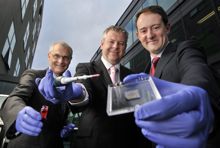2011 Press Releases
14.09.2011
Tyndall National Institute, UCC has announced the development of new nanosensor technology. The announcement was made at the Sensors & Their Applications XVI conference earlier this week organised by Tyndall. This technology will permit the highly sensitive detection of important biological molecules potentially indicative of glucose thereby providing pain-free monitoring for diabetics. The conference was officially opened Mr Seán Sherlock, TD Minister for Research and Innovation and covers all aspects of sensor research ranging from basic fundamental science right through to applications and commercialisation.
The highly advanced sensor technology, developed by a team of researchers at Tyndall National Institute, is based on individual nanowires manufactured on a silicon chip using microelectronic fabrication techniques. “The sensor technology can significantly out-perform current commercial detection devices by up to a 1,000 fold, in some cases. As well as in health, it has tremendous potential in a range of sectors including food and beverage, environment and security sectors where highly sensitive detection is required” said Dr Alan O’Riordan who leads the research team and is also chairing the conference.
“Many research teams around the world are looking at ways to detect the tiniest traces of the molecule called Hydrogen Peroxide. Many recognise the molecule for its characteristics as a bleaching agent used in hair dyes. However, in biological systems, Hygroden Peroxide is produced naturally and trace amounts exist in the body. Higher than normal levels may indicate the onset of a disease, for example, it may be produced at higher concentrations in the brains of people with Alzheimer's disease and it is also a key indicator molecule for detecting food spoilage. This research, funded by Science Foundation Ireland and the EU Framework Programmes, will now focus on detecting other key health related molecules including glucose and cholesterol,” added Dr O’Riordan.
Dr O'Riordan went on to say, “Tyndall is a key player in sensor research and in recent years has successfully won funding from both National and International funding agencies with over 100 people working at Tyndall in sensor related research. The development of new classes of highly sensitive nanosensor technologies will support the development of future device innovation and has tremendous benefit for improving the health and safety of our citizens as well as contributing to the generation of sustainable economic growth and employment creation.”
Picture: Professor Roger Whatmore, CEO Tyndall National Institute; researcher Dr Alan O'Riordan Tyndall National Institute and Mr Seán Sherlock, TD, Minister for Research and Innovation at the opening of the sensor technology conference.

